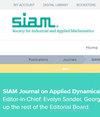宿主范围扩大导致灭绝
IF 1.8
4区 数学
Q2 MATHEMATICS, APPLIED
引用次数: 0
摘要
SIAM 应用动力系统期刊》,第 23 卷第 2 期,第 1677-1703 页,2024 年 6 月。 摘要.几乎所有人类新发疾病都是宿主范围扩展的结果,即一个物种的病原体进化出感染新宿主物种的能力。为了对病原体宿主范围扩张进行严谨分析,我们推导了一个洛特卡-伏特拉(Lotka-Volterra)动力系统,其中有两个相互竞争的宿主物种和一个寄生虫物种;寄生虫只感染其中一个宿主物种。我们对这一模型进行了稳定性和分岔分析。然后,我们询问,如果寄生虫进化出感染另一宿主的能力,将模型扩展到包括宿主范围扩大的寄生虫种群,会发生什么情况。我们根据系统参数为这个四维模型推导出了明确的全局稳定性和分岔条件。我们证明了寄生虫或病原体范围扩大后可能出现的四种结果,并为这些结果提供了局部和全局渐近稳定性条件。其中三种结果是意料之中的,而第四种结果却与直觉相反,它预示着宿主范围的扩大可能会导致原宿主物种灭绝。例如,如果一种本地寄生虫获得了感染栽培物种的能力,那么该寄生虫可能会导致一种本地物种灭绝。我们将简要讨论推动这一意外预测的现象及其影响。本文章由计算机程序翻译,如有差异,请以英文原文为准。
Extinctions Caused by Host-Range Expansion
SIAM Journal on Applied Dynamical Systems, Volume 23, Issue 2, Page 1677-1703, June 2024.
Abstract.Nearly all emerging diseases in humans are a result of host-range expansion, in which a pathogen of one species evolves the ability to infect a new host species. To present a rigorous analysis of pathogen host-range expansion, we derive a Lotka–Volterra dynamical system with two competing host species and a single parasite species; the parasite infects only one of the host species. We provide a stability and bifurcation analysis of this model. We then ask what happens if the parasite evolves the ability to infect the alternate host, extending the model to include a parasite population with an expanded host range. We derive explicit global stability and bifurcation conditions for this four-dimensional model in terms of the system parameters. We demonstrate that only four outcomes may occur following the range expansion of a parasite or pathogen, and provide both local and global asymptotic stability conditions for these outcomes. While three of these outcomes were expected, the fourth is counterintuitive, predicting that host-range expansion can drive the original host species to extinction. For example, a native species could be driven to extinction by a longstanding native parasite if that parasite acquires the ability to infect a cultivated species. We briefly discuss the phenomena driving this unexpected prediction and its implications.
Abstract.Nearly all emerging diseases in humans are a result of host-range expansion, in which a pathogen of one species evolves the ability to infect a new host species. To present a rigorous analysis of pathogen host-range expansion, we derive a Lotka–Volterra dynamical system with two competing host species and a single parasite species; the parasite infects only one of the host species. We provide a stability and bifurcation analysis of this model. We then ask what happens if the parasite evolves the ability to infect the alternate host, extending the model to include a parasite population with an expanded host range. We derive explicit global stability and bifurcation conditions for this four-dimensional model in terms of the system parameters. We demonstrate that only four outcomes may occur following the range expansion of a parasite or pathogen, and provide both local and global asymptotic stability conditions for these outcomes. While three of these outcomes were expected, the fourth is counterintuitive, predicting that host-range expansion can drive the original host species to extinction. For example, a native species could be driven to extinction by a longstanding native parasite if that parasite acquires the ability to infect a cultivated species. We briefly discuss the phenomena driving this unexpected prediction and its implications.
求助全文
通过发布文献求助,成功后即可免费获取论文全文。
去求助
来源期刊

SIAM Journal on Applied Dynamical Systems
物理-物理:数学物理
CiteScore
3.60
自引率
4.80%
发文量
74
审稿时长
6 months
期刊介绍:
SIAM Journal on Applied Dynamical Systems (SIADS) publishes research articles on the mathematical analysis and modeling of dynamical systems and its application to the physical, engineering, life, and social sciences. SIADS is published in electronic format only.
 求助内容:
求助内容: 应助结果提醒方式:
应助结果提醒方式:


